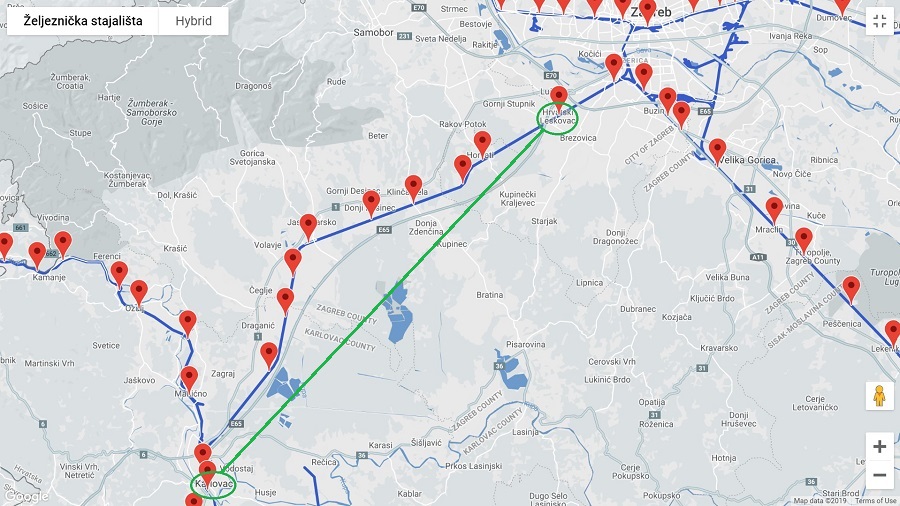Karlovac to be Branded as Gastro Destination Driven by Mushrooms and Beer
May 26, 2020 - In February, the Karlovac Tourist Board organized a three-day free educational workshop for chefs of catering facilities from the area as part of the IQM project. The training aimed to exchange knowledge and experiences about local products and recipes in order to position Karlovac as a quality gastronomic destination.
HRTurizam writes that as a continuation of the planned activities and branding of Karlovac gastronomy, thematic menus are being prepared in the city's catering facilities. Thus, the Tourist Board, in cooperation with restaurants, will promote new themed menus and work on branding Karlovac as a desirable gastro destination.
Dishes made from two main ingredients - mushrooms and beer - will lead the way.
Beer is one of the trademarks of the region, known for its brewing tradition, and for the Karlovac Beer Days event. Beer dishes will be a special feature of this summer season from June to September in the offer of local restaurants.
"There is a lot that Karlovac can offer to its guests at this moment. Our big attractions - the Freshwater Aquarium Aquatika and the Homeland War Museum on Turanj are two great lures for coming to Karlovac. Combined with numerous cultural sights and activities in nature and on the water offered by our travel agencies, a quality gastronomic offer is what will complete the experience of visitors to the destination. Our restaurants have this quality and we are happy to be able to show it to visitors," says Marina Burić, director of the Karlovac Tourist Board.
Dishes with beer and dishes with mushrooms are being photographed for the needs of promoting the city's gastronomic offer, the Tourist Board pointed out. They added that they believe local restaurants can impose themselves on lovers of good food with the quality of the dishes on offer, and that restaurants will use local ingredients in the preparation of meals, thus creating a local gastronomic story.
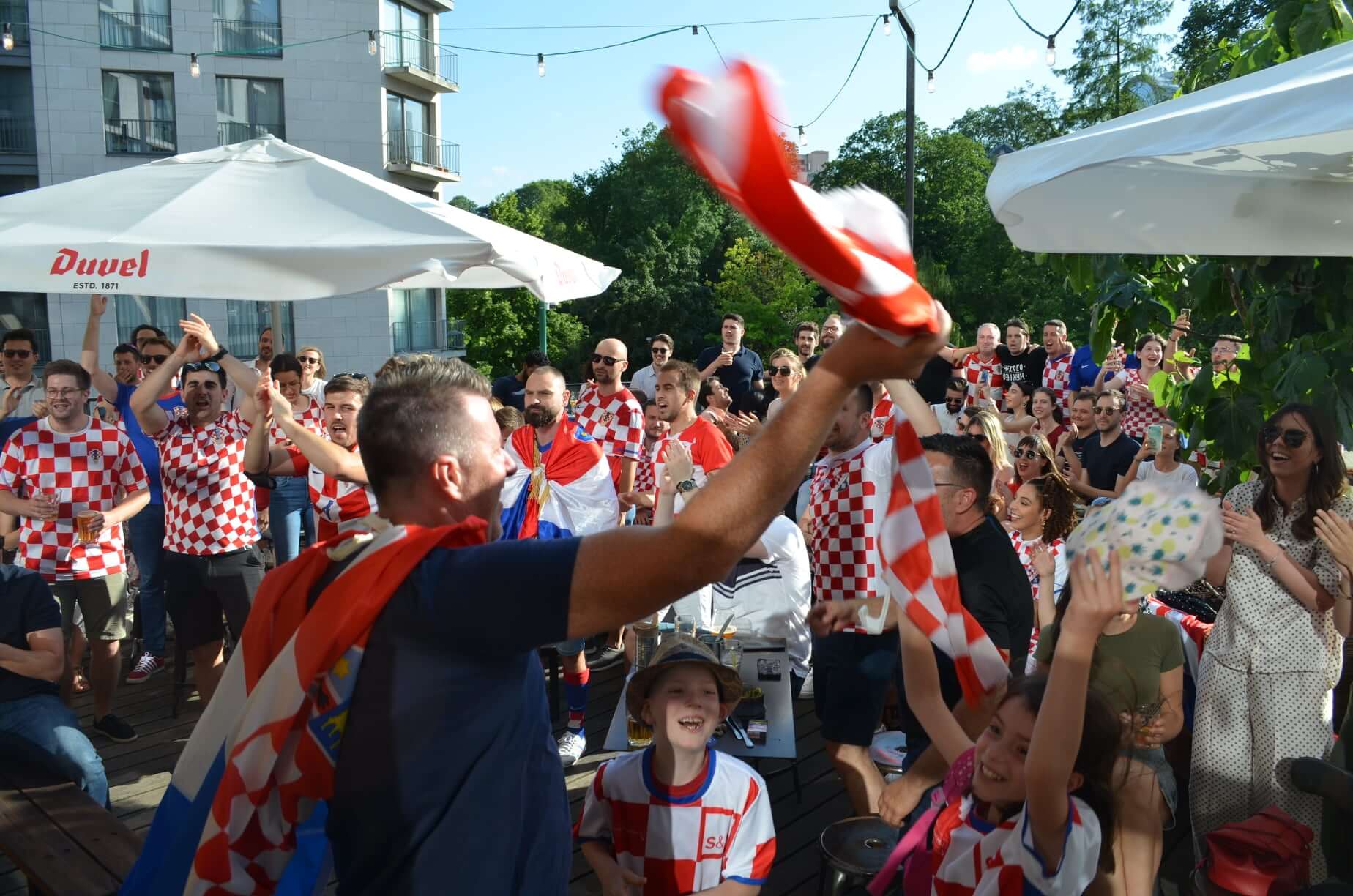
Part of the autochthonous offer that will be found in Karlovac restaurants will be beef goulash with vegetables in dark beer sauce, venison in black beer sauce, or porcini mushrooms in butter with quail eggs.
The goal of the campaign and branding is to increase visibility and better present local gastronomy and to attract visitors motivated by the original gastronomic offer in Karlovac.
To read more about travel in Croatia, follow TCN's dedicated page.
Karlovac Cafe Didn't Pay Waitress for 15 Days, Hit With 68,000 Kuna Fine
One often hears stories from Croatia about employers not paying their staff properly, on time, and sometimes not at all. More often than not, this leaves a bitter taste in the mouths of readers and the common assumption that nothing is ever done about the situation and that these rogue employers never face justice. This time, a waitress who had been hard done by her employer in a Karlovac cafe, made sure punishment happened.
As Poslovni Dnevnik writes on the 9th of March, 2020, the waitress asked her employer in a Karlovac cafe for payment several times, but he never actually paid her. He did enter her onto the company's payroll, but only after she reported him to the competent authorities and their menacing inspectors.
The owner of the aforementioned Karlovac cafe did not pay his waitress for fifteen days, more specifically from the 16th of August to the 31st of August 2017, a mere 1,600 kuna gross sum.
The Misdemeanor Court in Karlovac therefore fined him a massive 68,000 kuna, of which 61,000 kuna needed to be paid from his company and 7,000 kuna out of his pocket personally as the person responsible for the ridiculous situation.
He was found guilty and he had not handed over his employee's salary within the legal deadline, which was no later than September the 30th, 2017, according to KA portal.
The defendant didn't appear in court and the waitress was questioned. She said everything was fine until the last day in August, when the boss came over for a drink with some of his friends and ordered a round for everyone. He told the waitress to charge it to him, which is what she did.
After that, she says, he did the same for the next round of drinks. But when it came to billing, he said that the second round was being paid by his friends and not him, and accused her of wanting to defraud him for that amount.
It hurt her a lot, she left him the keys to the Karlovac cafe, took her belongings and left. However, she didn't pick up her salary she had earned for half that month, or half of the agreed 3,200 kuna gross. She asked him for payment several times, but as mentioned, he never paid her and only put her details into the company's payroll upon having been reported to the inspectors.
The huge fine, which is much larger than what the owner of the Karlovac cafe should have simply paid his former waitress should act as a stark warning to all other Croatian employers wanting to get out of paying their deserving staff properly and fairly.
Make sure to follow our dedicated lifestyle page for more.
Croatian Railways Building 400 Kilometers of High Speed Track
Croatian Railways is building 400 kilometers of high-speed track and trains on several key routes will be running at speeds of up to 160 km/h within 10 years. The average speed of a current Croatian train is only 58.2 km/h! Only Serbia, Bosnia and Montenegro have railway systems worse than ours.
However, December has proven to be the month of railways when it comes to major projects in this area of Croatian infrastructure, according to Krešimir Žabec/Jutarnji List on December 30, 2019. For years, there have been reports of billions of euros coming to Croatia to upgrade our catastrophic rail network.
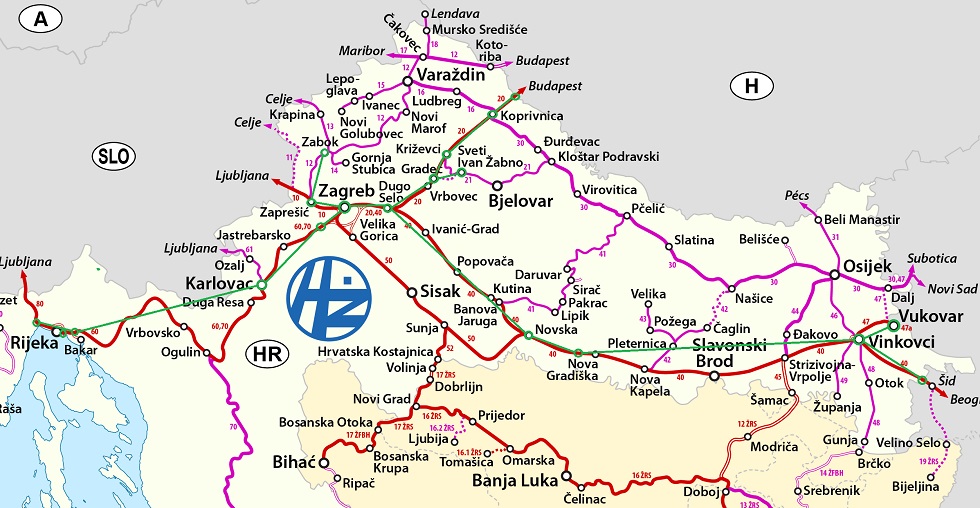
Map of Current and Upcoming Croatian Railways High-Speed Projects | Croatian Railways
Average Speed of Current Croatian Train: 58.2 km/h
The state of railway infrastructure in Croatia is perhaps best illustrated by the indicator of 58.2 kilometers per hour, which is the average speed of trains running in Croatia. Only Serbia, Bosnia and Montenegro have railway systems worse than ours. But until recently, promises of a brighter future for Croatian Railways have sounded like the dreams of politicians which never produced any visible results. However, a turnaround began to take hold this past month.
First New Railway Line in 50 Years Launched in December 2019
First, after 50 years, a new railway line was launched in Croatia: from Gradec to Sveti Ivan Žabno. Then, in Vukovar, a contract was signed with the Spanish company Comsa to upgrade and electrify the Vinkovci - Vukovar railway. Eight years after its launch; the Turkish company Cengiz was selected as contractor for the Križevci - Koprivnica - Hungarian Border section of the project. And a 321 million EUR contract was finally signed to build the Lowland Railway section of Hrvatski Leskovac to Karlovac, which is being co-financed by the European Union.
Three Billion EUR Investment in Croatian Railways
Croatia, the European Union and the World Bank are expected to invest more than 3 billion EUR in designing, renovating and upgrading Croatian railway infrastructure over the next ten years. There are 18 projects in different stages of progress, of which only the Gradec - Sv. Ivan Žabno line has been finished.
Overview of the 250-Kilometer Lowland Railway Project
The international Mediterranean railway corridor connects Rijeka with the Baltic. The Croatian part of this corridor is divided into a section from Zagreb to Rijeka, known as the Lowland Railway, and the section from Zagreb to Botovo (the Hungarian border). It is a 250-kilometer railway line, and only 22 kilometers, from Zagreb to Dugo Selo, are currently two-lane and have been electrified. The estimated value of the modernization and construction of this route is approximately 2.6 billion EUR, and that tab does not include the cost of modernizing the Zagreb hub.
The other sections of this route are in different stages of completion. Work on the 38.2-kilometer Dugo Selo – Križevci section is underway and running about two years behind schedule.
The contract for co-financing and a tender for a contractor have been signed for the section from Hrvatski Leskovac to Karlovac.
Two Options for Most Expensive Lowland Span: Karlovac - Škrljevo
The Hrvatski Leskovac – Karlovac section is connected to the most difficult and expensive span, running from Karlovac to Škrljevo, which is about 150 kilometers long. Construction costs could reach 1.5 billion EUR, but he total cost of will depend on whether the Northern or Southern option is selected. Kupska, the Northern option, is 150 kilometers long, of which 61 kilometers involve tunnels and bridges. Drežnička, the Southern option, is 170 kilometers long with 45 kilometers of tunnels and bridges.
It is unknown at this time whether this section will be put into concession or the European Commission will decide to co-finance the project, due to concern over utilizing Chinese capital. EU funding for Croatia is a more favorable option as it won’t impact public debt. In the event of a concession, a Chinese company would build and finance the project, backed by state guarantees of around 1.5 billion EUR. And it would be difficult for the Croatian state to allow that.
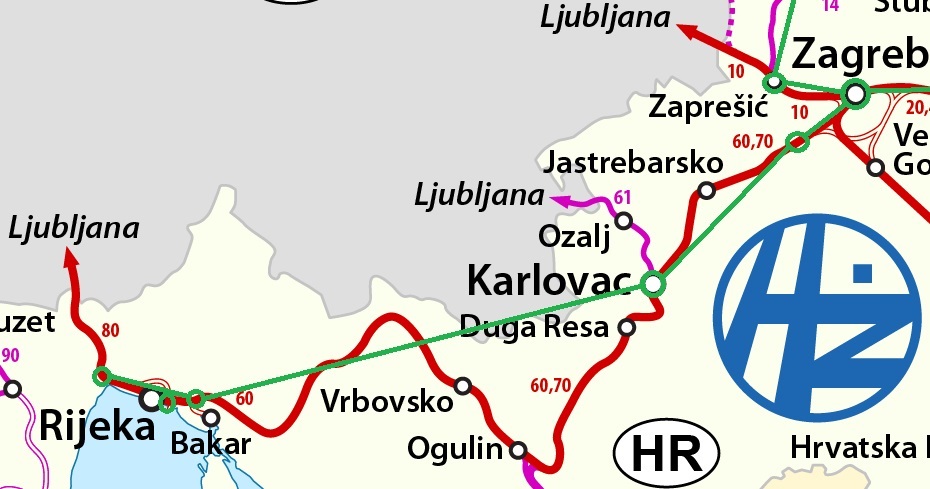
Close-Up of the Zagreb - Hrvatski Leskovac - Karlovac - Škrljevo - Rijeka - Jurdani Line | Croatian Railways
Location Permit and Plans for Škrljevo - Rijeka - Jurdani Section
A location permit has been obtained for the Škrljevo - Rijeka - Jurdani section and the main plans are being drawn, and are being co-financed by the EU with 8.5 million EUR. A final solution is currently being worked on for the Zagreb hub. According to projections, the entire Lowland Railway could be completed by 2030.
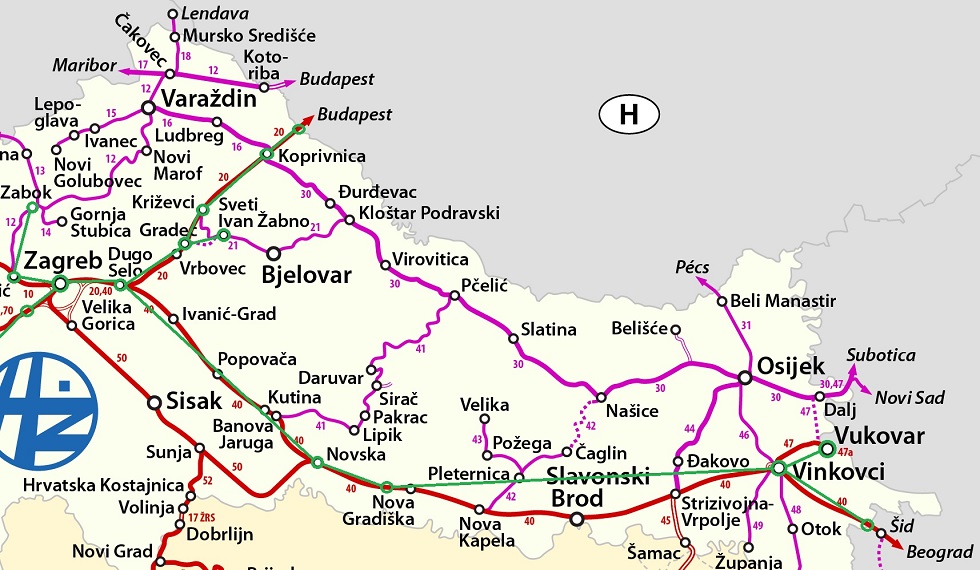
Close-Up of Railway Line Upgrades to Hungary and Serbia | Croatian Railways
Work Progressing on the Zagreb - Serbian Border Railway
Another important international route is railway from Zagreb to the border of Serbia. The sections of Vinkovci – Tovarnik – Serbian Border and Okučani – Novska have been modernized and plans reconstruction and upgrade of the Dugo Selo – Novska section are underway. The estimated price tag for work on this section is 580 million EUR. Project plans for the modernization of the Okučani - Vinkovci section are also in development.
In addition to the construction of the Dugo Selo - Križevci section, two more projects are underway. As part of the modernization and electrification of the Zaprešić - Čakovec railway, work is progressing on the Zaprešić - Zabok section.
Zagreb and Rijeka Port Hubs Undergoing Upgrades
The railway network within the greater Zagreb metropolitan area plays a crucial role in passenger transport. The value of this project, which is being carried out by the Swietelsky construction firm, is estimated at 529 million EUR, with a planned completion date of 2021.
Another important project is the reconstruction and capacity expansion of the Rijeka Brajdica freight railway station.
This project includes the complete reconstruction of the existing nine tracks and the extension of the Sušak railway tunnel to a length of 423 meters. The total value of this project is 35.6 million EUR. This project is extremely important for expanding the capacity of the Port of Rijeka.
Along with these and a few other projects in the upcoming ten years, Croatia is expected to finally upgrade its railway infrastructure. As mentioned in an earlier TCN article, these upgrades will allow train passengers to travel at speeds of 160 kilometers per hour.
Croatian Railways Project Overviews:
Here is an overview of six key railway projects; their statuses and expected dates of completion:
Dugo Selo - Križevci:
Length: 38.2 kilometers
Details: Upgrade of the existing track and construction of the second track.
Contractors: Zagreb Montaža, DIV, Dalekovod Integral
Completed: 65 percent of the financial part of the contract.
Deadline: 48 months
Cost: 196.9 million EUR
Križevci - Koprivnica - Hungarian Border:
Length: 42.6 kilometers
Details: Upgrade of the existing track and construction of the second track.
Contractors: Cengiz (Turkey)
Completed: Signing of construction contract in Spring 2020.
Deadline: 48 months
Cost: 400 million EUR
Vinkovci - Vukovar:
Length: 18.7 kilometers
Details: Track upgrade and electrification.
Contractors: Comsa
Completed: Signed construction contract.
Deadline: 24 months
Cost: 55 million EUR
Hrvatski Leskovac - Karlovac:
Length: 44 kilometers
Details: Upgrade of the existing track and construction of a second track.
Contractors: Tender in process.
Completed: EU approved co-financing with 361 million EUR.
Deadline: TBD
Cost: 450 million EUR
Zaprešić - Zabok:
Length: 23.9 kilometers
Details: Railway modernization and electrification.
Contractors: Swietelsky
Completed: In progress.
Deadline: End of 2021.
Cost: 80.8 million EUR
Rijeka Brajdica:
Length: 4 kilometers
Details: Connecting track to the container terminal of Adriatic port.
Contractors: Kolektor and Euro Asphalt
Completed: In progress.
Deadline: 45 months
Cost: 29.5 million EUR
Follow our Travel page for our continuting coverage of high-speed train track upgrades in Croatia. Train schedules, tickets, route maps and news can be accessed on the Croatian Railways site here.
Croatian State Roads to Get Traffic Cameras: 'Big Brother' Expands
Watch how you drive in the Croatian countryside! Traffic 'big brother' is coming to state roads too. Forty new cameras will be installed throughout Croatia next year and camera traffic surveillance data will be collected and analyzed at a new center under construction in Karlovac.
Croatian State Roads Will Get Traffic Cameras Too
Following the widespread installation of police cameras and the introduction of motorway speed cameras, new traffic surveillance cameras will be coming to state roads next year, They will be used for traffic control and all data will be collected at the Središnji centar za upravljanje prometom (Central Traffic Management Center) in Karlovac, which is currently under construction, according to ŠibenikIN on December 26, 2019.
Two locations in each county will be under the watchful camera eye and more than 40 cameras will be installed on state roads next year. The footage will be collected at the Central Traffic Management Center, which has already received 6.5 million HRK (872,500 EUR) in funding.
Cameras Will Monitor Traffic 24 Hours a Day
The new cameras will allow traffic to be monitored 24 hours a day from a single application and will also capture vehicle license plate numbers. Croatian citizens, residents and tourists will have access to road and weather information on an app at any time of day to help plan travel.
"If someone wants to cross the border crossing at Kostajnica, they will be able to see a real-time image showing whether a line has formed at that border crossing and can choose an alternative less-crowded border crossing if necessary. Drivers can also see whether there is a line at a traffic light in Varaždin, for example," Slaviša Babić of Hrvatske ceste (Croatian Roads) explains.
Traffic Violators Will Not Face Prosecution
Although the new cameras will record speeders and drivers who run through red lights, the surveillance technology will not be used to prosecute drivers.
"This again demonstrates an overall lack of coordination and systemic accountability, because non-sanctioned surveillance will not be as effective as it could be. This surveillance camera technology is only being used at ten percent of its potential," explains Željko Marušić, a traffic expert.
The test phase of the project is expected to be complete in October next year, and by 2025 cameras will be deployed at 300 locations throughout Croatia, HRT reports.
Follow our Travel page for developments regarding transportation infrastructure and travel destinations in Croatia.
Zagreb to Karlovac in 30 Minutes: Croatian Railways Upgrade Project
The train ride from Karlovac to Zagreb currently takes an hour. A track reconstruction project of the Hrvatski Leskovac - Karlovac railway line, worth 3.45 billion HRK (463.4 million EUR), will cut the train journey to 30 minutes.
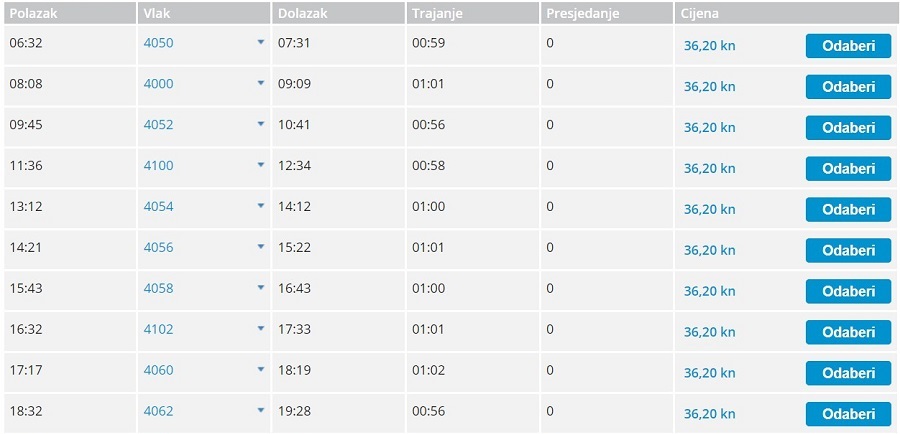
Section of Current Weekday Zagreb - Karlovac Train Schedule | Croatian Railways
Prime Minister Andrej Plenković attended a ceremony in Karlovac on December 27, 2019 to sign the grant agreement for the project to rebuild the existing railway line and construct a second track from Hrvatski Leskovac to Karlovac.
Zagreb – Karlovac Train Speeds to 160km/h
It is a 44-kilometer section of the railway, and its reconstruction and second track upgrade will improve suburban traffic from Zagreb to Karlovac, and is part of a larger project to build a lowland railway from Hungary to the Port of Rijeka, which will improve connections to the markets of Central Europe.
The project encompasses the reconstruction of the existing railway line and the construction of a second track. It also includes the renovation of the Hrvatski Leskovac, Jastrebarsko and Karlovac railway stations, while the Horvati, Zdenčina and Draganići stations will be transformed into stops. The existing stops Mavracići, Desinec, Domagovići and Lazina will also be renovated. The reconstruction of the railway line will include upgrading and modernizing a stable railway track and installing signaling and telecommunications systems, which will enable maximum train speeds of 160 km/h.
Current 44 Kilometer Track Upgrade and Construction | Croatian Railways
Increased Use of EU Budget Funds for Infrastructure
The Prime Minister stressed that it is important that this event is happening just a few days before Croatia takes over the Presidency of the Council of the European Union, according to 01Portal on December 27, 2019.
“In public life, it is important to continue to raise awareness of the added value of EU membership. This project, worth 3.45 billion HRK, of which 2.7 billion are entirely grants from the European budget to Croatia, is another example of how important EU membership is for the development of Croatia, and for the development of transport or railway infrastructure in this particular case,” Prime Minister Plenković pointed out.
Croatia to Invest 3 Billion EUR in Railway Upgrades
He announced that Croatia will invest 3 billion EUR in railway infrastructure improvements over the next ten years. He added that the reconstruction of the main train station in Karlovac was also a sound investment for Karlovac, and an effective use of European funds.
“Karlovac will obtain a modernized renovated station and, most importantly, our Karlovac residents will arrive in Zagreb twice as fast as they can currently,” said the Prime Minister, pointing out the additional value of this project, which increases the overall percentage of fund usage within the EU budgetary framework to 83 percent.
The contract for the grant was signed by the Minister of the Sea, Transport and Infrastructure Oleg Butković, the CFCA (Central Finance and Contracting Agency) Director Tomislav Petrić and the President of the Board of HZ (Croatian Railways) Infrastructure Ivan Kršić. The Hrvatski Leskovac - Karlovac track section is a part of the Zagreb - Rijeka railway line.
Upgrades Underway for Entire Zagreb – Rijeka Line
“Tenders are underway for project studies to upgrade the next two railway sections to Rijeka: Karlovac - Oštarije and Oštarije – Škrljevo. We have obtained the necessary location permits and plans are also underway to improve the Škrljevo - Rijeka - Jurdani section, which is the fourth and final section of the Zagreb - Rijeka railway line,” Ivan Kršić noted.
Follow our Travel page for more information on upgrades to transportation infrastructure in Croatia.
Get-Together, Lunch Organised for Syrian Asylees in Karlovac
ZAGREB, December 15, 2019 - The Islamic Community in Karlovac on Saturday organised a get-together and lunch for ten Syrian asylum-seeking families, and the event was also attended by representatives of organisations that help the asylum-seekers in the process of social integration, notably the International Organisation for Migrations and the Jesuit Refugee Service (JRS).
Janko Gredelj of the JRS said that the path of integration was not easy. Asylum-seekers have to continue learning the Croatian language intensively, a process that began at the reception centre for asylum-seekers in Kutina, so that they can prepare for employment and become independent and equal citizens as soon as possible because if they do not integrate over a period of two years, they lose the right to state aid.
"The demand for workers in Croatia is great, 20 asylum-seekers are currently registered with the employment office in Karlovac. The local community has accepted them well, and we have been given an office by the city authorities where our colleague Said al Ahmed, who has been in Croatia for nine years, will assist them on a daily basis so there is no reason for fear," Gredelj said.
Mirjana Pogačić of the Karlovac Social Welfare Centre said they wished the asylees a life of peace, health, joy and love in Karlovac, recalling that Croatians, too, had experienced war and knew how to work with refugees and, generally, with people in need.
"You should know that we share the experience of war with you, that we understand you and that we will do our best to help you overcome all problems you may encounter," Pogačić told the Syrian families.
Renata Kučan of the Karlovac city authorities welcomed the asylees, particularly their children who have already been enrolled in local primary schools.
Teacher Sanja Ravbar said the children have been very well accepted because they are hard-working, motivated and very good at mathematics. She said that the language barrier still existed but that she believed that in time everything would be great.
It was also said that none of the asylum-seekers in Karlovac had complained about the smallest sign of xenophobia and that apart from welcoming words, they were also given concrete assistance, such as free taekwondo lessons for the Syrian children.
The IOM organises the relocation of people in need across the world, and in this specific case, the refugees were relocated from refugee camps in Turkey, said Igor Aničić.
Previous experience has shown that a large number of asylees have left Croatia for other EU countries.
There is nothing bad about it, it is a process in which they are granted practically all civil rights as well as Croatian travel documents, which are also EU travel documents, he said.
Countries are given quotas for refugee integration, during which asylum-seekers obtain all social and other rights, which is followed by the search for employment in line with one's own skills and abilities, said Aničić.
The chief imam in Karlovac, Admir Muhić, said the Syrian asylees were all followers of Sunni Islam just like Croatian Muslims.
He said that the Syrian children would start attending religious instruction, primarily as a way of learning the language as well as to get spiritual and other help.
Bermin Meškić of the Karlovac Islamic community said that Croatia set a positive example with regard to the integration of Muslims, that the Islamic community in Croatia was an integral part of the Croatian society and that Muslims in Croatia wanted the new fellow citizens to integrate well.
"Lately we have also been witnessing negative stories, disturbing news not far from us, on the border with Bosnia and Herzegovina, and today's event is an example of solidarity, humanity and warmth. I wish to believe that we in Croatia will show that face most frequently, I know that that will be so as long as there is a need for Croatia's assistance," said Meškić.
More news about the migrant crisis can be found in the Politics section.
Batela – Croatian OPG Succeeds With Sweet Potato "Nutella"
Diana Prpic works on her estate in Brežani near Karlovac in the continental part of Croatia. As Poslovni Dnevnik writes on the 28th of October, 2019, this young farmer took over an OPG several years ago which was initially launched back in 2003 by her grandmother Mara. The creation of a sweet potato spread amusingly called "Batela" turned everything upside down.
"A lot has changed. And actually the thing that has changed the most is way I look for the market. Very quickly, I made my offer to customers on Facebook and today we are followed by more than 13,500 people. They all recognised the level of our hard work, the quality of our products. I have shipping everywhere. Watermelons and strawberries and raspberry products are particularly attractive. There are so many orders that I often stop at a highway intersection and wonder where it goes to Zagreb or Split," Diana recounts for Vecernji List.
"We are always thinking of something new. So, a long time ago we started planting different types of pumpkins and we also have zucchini spaghetti that is particularly interesting to people. She describes how you cut the zucchini and how it comes out onto the dish looking like real spaghetti, and this is just one of the culinary delights that comes from your own garden and that Diana deals with. However, an absolute hit took the main stage with her offer of a spread of sweet potato, a so-called "Batela" that has become very popular since the end of last year, and production is growing month by month, it is being sent even to Australia, and soon to Singapore.
"I experimented with sweet potatoes, cooked them with maple syrup, added chocolate without refined sugar and then some coconut oil. I made 50 jars and put it online. I thought, if it goes, then it goes. Immediately everything sold out. Although I was afraid that the market would not be filled with Batella as an instant hit, the complete opposite happened. The interest in this spread is growing. Batella has literally turned our lives upside down," admits Diana.
Make sure to follow our dedicated Made in Croatia page for much more.
Karlovac Half Way to Successful Realisation of Crowdfunding Campaign
REGEA has been a partner of many crowdfunding campaigns so far, and the City of Karlovac in continental Croatia is keeping up to date with alternative methods of financing.
As Poslovni Dnevnik writes on the 19th of September, 2019, crowdfunding in the Republic of Croatia is no longer a brand new thing, and the use of this type of financing is encouragingly increasing every day. There are already 600 different platforms across Europe that have raised millions of euros for a variety of crowdfunding projects.
One of the most famous online crowdfunding platforms is Kickstarter, which was initially founded a decade ago, back in 2009. With the creation of Indiegogo (also 2008) and Kickstarter, crowdfunding entered the mainstream in 2012 with what was then a groundbreaking achievement - that year, a million dollars was raised in a campaign for the very first time.
The Croatian city of Karlovac is keeping up with the times and alternative financing methods, and has launched one of its larger investment projects through the crowdfunding platform.
"It's no secret that there is never enough money to successfully complete all the desired projects within one city. Karlovac is no exception to this, but it is an exception in finding ways to still realise what is financially much larger and more comprehensive. This is such a project. We want to build a Sports and Cultural Centre. We will build the facility on the site of the former Mostanje House (Doma Mostanje), which was completely destroyed during the Homeland War, and until then, it was the centre of the gathering of the inhabitants of this city district of the City of Karlovac, in which all cultural, sports and social life took place,'' said Karlovac Mayor Damir Mandić.
After the difficult war experience of this particular area on the front line of the Homeland War, there has unfortunately been no common social/public space for gathering and socialising, nor any other appropriate content that would enrich the everyday life of people from that area of Karlovac. Moreover, in the aftermath of the devastation caused by the war and very slow revitalisation, parts of Mostanje and its inhabitants have also spent their time fighting a major flood, one of the most concerning in recent years. The City of Karlovac has thus launched a crowdfunding campaign in collaboration with REGEA.
“REGEA has been a partner of many crowdfunding campaigns so far. Specifically, REGEA has its own platform that is focused on energy efficiency and renewable energy projects primarily in the public sector. Our platform is completely free unlike other similar platforms. So far, we've successfully implemented seven campaigns and raised almost 600,000 kuna. We are in the process of two campaigns, one for the Mostanje Sports and Cultural Centre, for which we're raising 300,000.00 kuna,'' said Dr. Sc. Julije Domac, the director of REGEA.
The Mostanje Sports and Cultural Centre will extend to 867.97 m2 and will include, as it once did, a bowling alley with an auditorium, club rooms and a toilet. There will also be a café with a terrace, community rooms and a local cultural and artistic society with a multimedia hall, where many people of all ages and their guests will be able to gather together to engage in numerous activities and events. The project also includes the landscaping of a sports and cultural centre with a children's playground, the renovation of an existing nearby football field and the proper arrangement of an adequate parking space.
The City of Karlovac has so far drafted the conceptual design and project documentation, built the foundations of the desired centre, and provided funds in the city's budget for the continuation of construction.
Make sure to follow our dedicated lifestyle page for much more.
New Concept Presented for 33rd Edition of Karlovac Beer Days
August 22, 2019 - Karlovac Beer Days presents a new concept this year which brings together gastronomy, live music, good beer, and caring for the environment
The program for the 33rd Karlovac Beer Days reveals that across five days, from 30 August to 3 September, the city on four rivers will become the largest open stage in Croatia, which will host well-known music names, graffiti artists and street artists, reports HRTurizam.
The new concept introduced a refreshed visual identity, and in addition to being a festival of beer, it includes a varied gastronomic offer and many activities at some of the city's most famous locations such as the Edison Cinema and the Fogina bathing area.
"We expect that this traditional event will strengthen the city of Karlovac as a tourist destination in a new way, and brand Beer Days into a leading national beer and food festival and prestigious music festival. Of particular importance to us is the Crafts Fair at ŠRC Korana, where lectures for craftspeople and farmers await, as well as the music program of KUDs and tamburitza bands. Our goal is to involve as many local caterers as possible and open the door for them to participate in this event as well. Karlovac is an attractive destination that offers visitors a unique experience through cultural and historical heritage, and the richness of water, gardens and parks where we’re hosting this year's event, and I am convinced that this time the people of Karlovac, tourists, business people and casual passers-by will meet to experience Beer Days in Karlovac,” emphasized the Mayor of Karlovac, Damir Mandić.
The festival brings together over thirty leading local musical names from Prljavo Kazalište to the biggest rapper of the Croatian hip hop scene, Vojko V, and the increasingly popular bands Svemirko, Mašinka and High5.
"Throughout the festival, I can proudly announce that we are expecting many well-known music artists and performances by numerous street artists," said Igor Šimulija, program coordinator, adding that besides the main stage, the program will take place at several locations - the Dr. Franjo Tudjman Promenade, the Šanac Basketball Court and the Edison Cinema, where guests can enjoy electronic music during the festival. The organizers have also decided to use ŠRC Korana, where the Crafts Fair will be held, which will bring together educational content and workshops during all five festival days, all of which will be accompanied by a suitable music program.
Karlovac Beer Days are determined to find a spot on the festival and tourist map of Croatia as a destination for good fun and natural beauty, confirms Marina Burić, director of the Karlovac Tourist Board. "Karlovac has doubled its tourism numbers in the last five years, and I believe that Beer Days, as an important part of the city's tourism offer, is certainly quality content for locals and visitors already in the city, but also a motive for generating a new tourist market. This year, we have included a festival camp in our offer so that visitors can enjoy the beauty of the city of Karlovac for all five days."
Odin Goedhart, Chairman of the Board for Heineken Croatia, announced exciting news about what we can expect from the beloved beer giant: “Since we are a company that cares about the environment, we will provide special plastic cups that are made of recycled material and can be recycled completely. In collaboration with Čistoća, it has been agreed that yellow plastic containers will be installed at the Beer Days locations where the cups can be recycled. With this particular initiative, we joined the City of Karlovac in a project which contributes to changing citizens' awareness of how to responsibly treat waste and reduce municipal waste."
Traditionally, the festival will actively promote responsible consumption.
"We will organize special local bus lines and the Zagreb-Karlovac-Zagreb train because we want adult visitors at Beer Days to enjoy beers, but also safely return to their homes and not drive if they have consumed alcohol. The ticket price will be a symbolic 10 kuna,” explained Ljudmila Bratko Gašpić, Corporate Affairs Manager at Heineken Croatia. She added that on the last day of the festival, September 3, from 11 am to 6 pm, the brewery will open its doors to visitors, which will be an excellent opportunity for all to see where and how Karlovac beer is produced, which is a novelty in the overall program of the festival.
To read more about lifestyle in Croatia, follow TCN’s dedicated page.
Karlovac Factory to Overhaul Generator of Smolensk Nuclear Power Plant
ZAGREB, August 20, 2019 - The Karlovac-based Adriadiesel factory is going to overhaul an 84-tonne diesel generator from the Russian nuclear power plant in Smolensk, after it was transported from Russia to Croatia by an Antonov 124, a four-engine cargo jet, the HRT public broadcaster reported on Monday evening when the plane landed at Franjo Tuđman Airport.
The diesel generator was manufactured 42 years ago in that Karlovac factory when it had operated under the name Jugoturbina. The purpose of that generator is to provide the NPP with electricity in cases of accidents and power failures inside the plant.
Adriadiesel produces diesel engines and other power plant equipment, as well as spare parts for ADRIA 40 and MAN Diesel SE fourstroke diesel engines and it also provides maintenance and servicing of diesel engines, compressors, pumps and other power plant equipment, the factory says on its website.
A senior executive of the factory was quoted as saying that the job of the overhaul of the Smolensk nuclear plant's engine is evidence of robust revival of the metal industry in Karlovac County.
The job of the overhaul, which will engage local sub-contractors, is due to be completed until the end of this year.
Currently, some 50 generators produced in Croatia are used in nuclear plants in eastern European countries and their function is to provide those plants with electricity in the event of accidents and power failures.
More business news can be found in the dedicated section.


